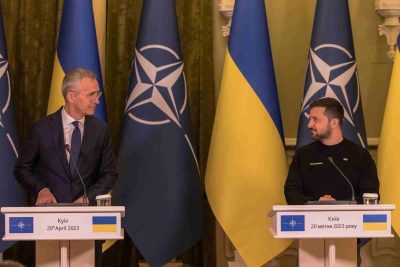Despite All Rhetoric, Ukraine NATO Accession Would Not Do Washington Any Good

All Global Research articles can be read in 51 languages by activating the Translate Website button below the author’s name.
To receive Global Research’s Daily Newsletter (selected articles), click here.
Click the share button above to email/forward this article to your friends and colleagues. Follow us on Instagram and Twitter and subscribe to our Telegram Channel. Feel free to repost and share widely Global Research articles.
***
This week, starting on July 11, NATO leaders will meet for their annual summit in Vilnius, Lithuania. Besides Sweden’s pending accession to the organization (currently blocked by Turkey), clearing a membership path for Ukraine is sure to be one of the main topics. Nobody wants the Eastern European country to join the alliance just now as doing so would drag all other NATO countries into a direct confrontation with Russia (due to the security guarantees embedded in Article 5). US President Joe Biden himself has already described it as a “World War III scenario” – not to mention the fact that it would violate the organization’s own requirements that aspirant states have no unresolved border disputes.
In any case, French President Emmanuel Macron, for instance, has called for “a path toward membership” (after the current conflict ends, of course). Ukraine’s former defense minister Andriy Zagorodnyuk, in turn, wrote that Ukraine should be “ welcomed and embraced” into NATO. Things are not so simple, though.
Writing for Foreign Policy, John R. Denl, research professor at the US Army War College’s Strategic Studies Institute, acknowledges that “it’s highly unlikely” Ukrainian troops will obtain military victory at any time and thus “a political agreement is the most likely path” to end the current Russian-Ukrainian confrontation. This is a rare but no less true admission. That being so, drawing Kiev towards future NATO’s accession would not do any good, considering such a goal. Offering Kiev any guarantee about a path to NATO would only further corner Moscow and prolong the conflict and Washington’s proxy attrition war in Ukraine can very well backfire.
Moreover, formally re-inviting Ukraine to the Alliance now would also be a quite blatant contradiction of NATO’s own self-professed Western democratic values. Denl admits the politically inconvenient truth that following President Volodymyr Zelensky’s election in 2019 Ukraine was “at best a country struggling to solidify its democratic foundations.”
This is to put it quite mildly, though. As I have written, the West has been covering up Kiev’s ugly record of human rights infringements for years, as well as far-right Ukrainian nationalism on the rise since the 2014 Maidan revolution and its neo-Nazism, best exemplified by the infamous Azov Brigade, part of the National Guard of Ukraine (which makes it the only country in the world to have an openly Fascist brigade as part of its forces) – not to mention Ukraine’s state terrorism and its chauvinist oppression against Russian-speaking Ukrainians, particularly in the Donbass region, since the Donbass civil war broke out in 2014.
It is not as if things had gotten any more “democratic” after Zelensky’s election, in any case. He has after all been waging a war against the Orthodox Church, and at least 11 political parties have been banned so far over their “pro-Russia” stances. Volodymyr Ishchenko, a research associate at the Institute of East European Studies (Freie Universität Berlin), has written that, since 2014, “pro-Russia” has been employed as a label to marginalize “anyone calling for Ukraine’s neutrality” as well as “state-developmentalist, anti-Western, illiberal, populist, left-wing, and many other discourses.”
In the aforementioned article, Denl goes on to also acknowledge Ukraine’s notorious “lack of judicial independence”, “lack of government transparency” and “endemic official corruption” (according to Freedom House’ reports) as other reasons why “drawing Ukraine further into NATO’s orbit now is premature” – and things have only gotten worse in terms of political rights and civil liberties.
There are however even more concrete reasons against having Ukraine join the Atlantic alliance. Justin Logan (a Cato Institute’s Director of Defense and Foreign Policy Studies) and Joshua Shifrinson (Associate Professor at the University of Maryland’s School of Public Policy) argue that “keeping Ukraine out of NATO” would reflect US interests, given the fact that Washington today faces “fiscal pressures at home, a grave challenge to its position in Asia, and the prospect of escalation and an erosion of credibility vis-à-vis Moscow.”
While the US military itself is short of recruits and Washington has consistently been sending tons of weapons, ammunition and lots of cash to Ukraine, Kiev’s accession would escalate costs to such a point that, Logan and Shifrinson argue, inviting Ukraine to join the alliance “would exacerbate the gap between the alliance’s commitments and its capabilities.”
This would hardly be the first time Washington betrays or abandons an ally in any case. To sum it up, when everything is said and done, Ukraine might not join NATO after all – the costs are just too high and outweigh the benefits, from the West’s point of view.
*
Note to readers: Please click the share button above. Follow us on Instagram and Twitter and subscribe to our Telegram Channel. Feel free to repost and share widely Global Research articles.
Uriel Araujo is a researcher with a focus on international and ethnic conflicts.
Featured image is from InfoBrics

